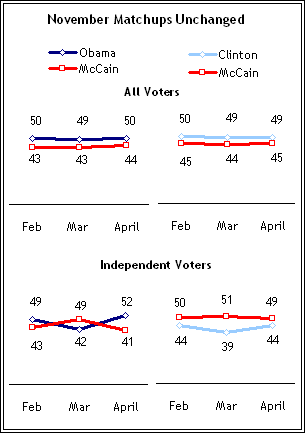
While the dynamics of the Democratic primary contest continue to fluctuate, voter preferences in general election matchups between either Obama or Clinton and McCain remain stable. Among registered voters nationwide, Barack Obama holds a six-point edge over McCain (50% to 44%) while Clinton leads McCain by a comparable margin (49% to 45%). Neither race has changed over the past two months, with Clinton and Obama consistently holding slim leads over McCain.
The preferences
of independent voters have shifted, particularly in the Obama-McCain matchup. A month ago, 49% of independents favored McCain, while 42% favored Obama. In the current survey, Obama holds a 52% to 41% advantage over McCain among independents. Hillary Clinton, by comparison, continues to struggle to win over independent voters; while Obama currently leads McCain by 11 points, Clinton trails McCain by five (45% to 49%).
While Obama clearly has more appeal than Clinton to independent voters, this advantage is counterbalanced by his struggles with conservative and moderate Democrats. Overall, 18% of Democratic voters say they would support McCain over Obama, and the number rises to 23% of conservative and moderate Democrats. By comparison, just 12% of Democrats overall, and 14% of conservative and moderate Democrats, favor McCain over Clinton. Liberal Democrats are equally loyal to the party’s nominee whether it is Obama or Clinton.
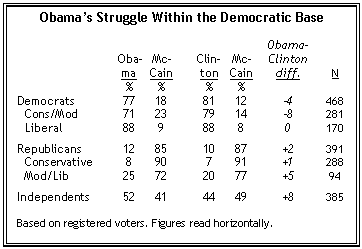
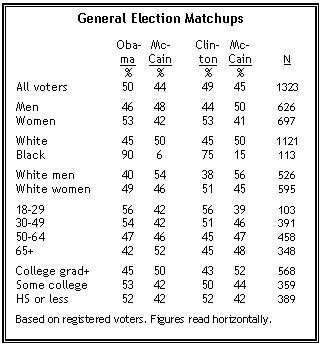
The question of whether Obama or Clinton will head the Democratic ticket has little impact on other demographic patterns of candidate support. There is a substantial gender gap, with both Obama and Clinton running about equally well against McCain among women, and McCain running stronger among men. Voters under age 30 prefer either Democrat over McCain by comparably large margins, while McCain runs stronger among older voters.
White voters favor McCain over either Democrat by five points (50% to 45% in both head-to-head matchups). Fully 90% of black voters say they will vote for Obama over McCain, compared with 75% who will back Clinton over McCain.
Economy Tops the Issue Agenda
The economy has become the dominant concern among voters in the 2008 election. When asked what issue they most want to hear the candidates talk about, 44% cite the economy, up from just 15% in November 2007. When other economic issues are included, such as jobs and unemployment (5%), the national debt and budget deficit (4%), about half of voters cite an economic concern as the top issue in the campaign.
Economic concerns top the list of campaign issues for Republicans, Democrats and independents. The focus on the economy also spans race, gender and age groups. College graduates are as likely to prioritize the economy as are high school graduates, and while there are some differences across income groups, they reflect different economic priorities. Those in households earning under $50,000 annually are more likely to cite jobs and unemployment, while those earning over $50,000 more often cite the general economic state of the nation.
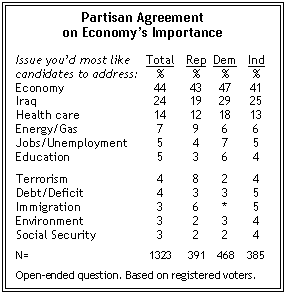
As the economy has become more important, both Iraq and health care have decreased in importance over the past five months. About a quarter of voters (24%) say that Iraq is the issue they want to hear most about, down from 32% in November. Iraq is cited as a top election issue more frequently by Democrats (29%) and independents (25%) than by Republicans (19%). The proportion of voters citing health care as the top issue fell from 22% in November to 14% today. More Democrats (18%) than Republicans (12%) or independents (13%) list health care as the issue they most want to hear about.
More Americans want to hear about energy and gas prices as campaign issues than in November 2007. Currently, 7% cite energy and gas prices, up from 2% in November. Other issues, such as education (5%) and terrorism (4%) continue to be cited less often as top campaign issues. More Republicans (8%) want to hear about terrorism than do either Democrats (2%) or independents (4%).
Democrats Lead McCain on the Economy
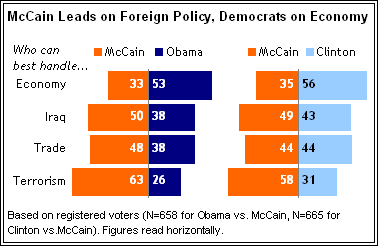
When it comes to the most important issue this election, voters believe that both of the Democratic candidates can better handle the economy than McCain by wide margins. When asked to compare McCain and Obama, 53% of voters say that Obama could do the best job of improving economic conditions while only 33% say McCain. Similarly, when asked whether McCain or Clinton could do the best job on the economy, 56% choose Clinton and 35% McCain.
In contrast, voters overwhelmingly think McCain can do a better job of defending the country from future terrorist attacks. By greater than two-to-one (63% vs. 26%) more say McCain, rather than Obama, can best handle the issue of terrorism; the margin is not as wide when voters are asked to choose between McCain and Clinton (58% vs. 31%).
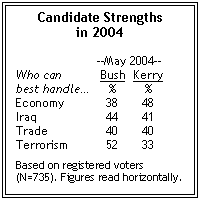
Notably, McCain’s lead over the Democrats on terrorism is wider than the advantage Bush had over Kerry in 2004 on this issue. In May 2004, Bush held a 52% to 33% edge over Kerry on who could do the best job of defending the country from future terrorist attacks.
McCain also holds an advantage over Obama, but not over Clinton, when it comes to the issues of Iraq and trade. He holds a 12-point edge over Obama (50% to 38%) on who can best handle the situation in Iraq, compared with a narrower six-point edge over Clinton (49% to 43%). By comparison, in May 2004 about the same number cited Bush (44%) and Kerry (41%) as best able to handle the situation in Iraq.
When it comes to handling U.S. trade policies, McCain holds a 48% to 38% edge over Obama, while McCain and Clinton are tied at 44% each.
Clinton’s Issue Strengths
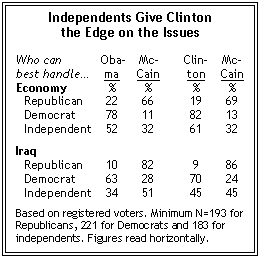
While independent voters express substantially more support for Obama at the top of the Democratic ticket than they do for Clinton, they tend to rate Clinton as the stronger candidate on many issues. On the economy, she holds a 61% to 32% margin over McCain among independents, compared with a 52% to 32% margin for Obama. And the gap is even more noticeable when it comes to handling Iraq, where Clinton runs even with McCain (45% each) among independents, while Obama trails by a 34% to 51% margin.
While Democrats overwhelmingly favor both Obama and Clinton over McCain on issues, Clinton’s advantage is consistently larger. By nearly three-to-one (70% to 24%), Democrats favor Clinton over McCain on handling Iraq; Obama’s advantage, while substantial, is not as large (63% to 28%).
Candidate Ideology
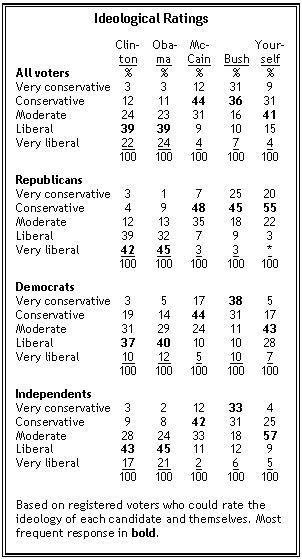
Majorities of voters describe Clinton and Obama as liberal and McCain as conservative, but the presumptive Republican nominee is seen as much more centrist than either Democratic candidate. About three-in-ten voters (31%) who are able to McCain’s ideology describe him as moderate; by comparison, 24% describe Clinton as a moderate and 23% say that about Obama. About four-in-ten voters (41%) describe themselves as politically moderate.
A 56% majority of voters say McCain is conservative, but only 12% describe him as very conservative. By comparison, two-thirds describe George W. Bush as conservative and 31% say he is very conservative. Clinton and Obama, on the other hand, are seen as liberal by 61% and 63% of voters, respectively. Comparable percentages also view each as very liberal (24% Obama, 22% Clinton). More voters view Obama as very liberal than did so in January (15%); the proportion saying Clinton is very liberal has not changed.
A majority of Democrats (52%) see Obama’s political views as liberal, while somewhat fewer (47%) say the same about Clinton’s views. Only about one-in-ten say either candidate is very liberal. By contrast, only 35% of Democratic voters describe their own political views as either liberal (28%) or very liberal (7%), while 43% describe themselves as moderate.
Republican voters are far more likely than Democrats to describe both Clinton and Obama as liberal; about eight-in-ten Republicans describe Clinton (81%) and Obama (77%) as liberal. This includes more than four-in-ten who perceive each candidate as very liberal (42% for Clinton, 45% for Obama). There is greater agreement among Republicans and Democrats about McCain’s ideology; 55% of Republicans and 61% of Democrats say McCain is conservative.
Most independents (54%) view McCain as conservative. By comparison, 60% of independents say Clinton is liberal and 66% say Obama is liberal. Fully 57% of independents rate their own political views as moderate; 29% say they are conservative, and 14% consider themselves liberal.


